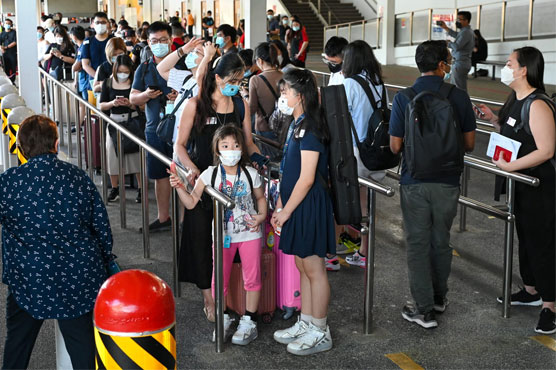Singapore, Malaysia ease Covid travel curbs

Singapore, Malaysia ease Covid travel curbs
SINGAPORE (AFP) - Singapore and Malaysia eased coronavirus travel restrictions on one of the world’s busiest land borders Monday after nearly two years, allowing some vaccinated people to cross without quarantine.
Before the pandemic, about 300,000 people used to commute across the border from Malaysia every day to the neighbouring city-state, to work in areas ranging from public transport to electronics manufacturing.
But most travel was halted in March last year, leaving many who previously commuted, and other Malaysians in Singapore, effectively stuck there as they needed to continue working.
From Monday, vaccinated Singaporean and Malaysian citizens, those holding permanent residency status and work permits can cross the one-kilometre (0.6-mile) causeway separating the countries without having to quarantine.
"I feel happy to be able to go back and meet my family finally after two years," Eunice Teoh, a Malaysian getting the first bus from Singapore under the scheme, told AFP.
"I do feel a bit nervous because this is the first batch, and I’m not really sure what will happen," added the 28-year-old, who works in finance and was heading to the Malaysian state of Pahang.
Initially, around 3,000 people a day will be able to cross using special bus services, and will have to take virus tests.
Officials say the initial stage is aimed at workers who have been unable to see families for some time, and they plan to expand it later to other groups.
Restrictions were also eased Monday on air travel, with vaccinated people allowed to fly between the countries’ main airports without quarantining.
Prior to the easing of curbs, citizens and some other groups were still allowed to travel between the neighbours, but they had to quarantine on arrival.
Both countries have high vaccination rates. Singapore’s outbreak has been mild by global standards, although Malaysia faced a serious wave in recent months driven by the Delta variant.
Malaysians have long been a key part of the workforce of wealthier Singapore, which has a population of just 5.5 million, where they typically earn higher salaries than back home.
The neighbours were part of the same country for two years from 1963 but it was a stormy union, and Singapore was eventually kicked out.

